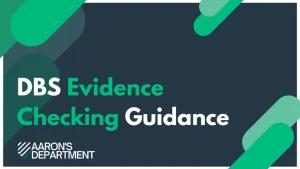
The Enhanced Disclosure and Barring Service (DBS) check is the most detailed level of criminal record screening available in the UK. It plays a crucial role in safeguarding vulnerable individuals, particularly in professions that involve working with children, vulnerable adults, or sensitive sectors such as healthcare, education, and social services. This article provides an in-depth look at what an Enhanced DBS check is, how to apply for one, what supporting documents are required, and why it is essential in certain roles.
What Is an Enhanced DBS Check?
An Enhanced DBS check is a comprehensive criminal background check that not only includes spent and unspent convictions, cautions, reprimands, and warnings from the Police National Computer (PNC) but also additional information held by local police forces that is deemed relevant to the role. This makes it the most thorough form of DBS check, essential for positions involving a high degree of responsibility and trust, particularly where individuals are in direct and unsupervised contact with children or vulnerable adults.
The Enhanced DBS check can also include a check against the adults’ and/or children’s barred lists, which identify individuals barred from working with these groups. This added layer of protection is crucial for safeguarding purposes.
Where and How to Apply for an Enhanced DBS Check
An Enhanced DBS check cannot be requested by individuals for personal use. It must be applied for by an employer or an organization on behalf of the applicant, typically when they are being considered for a role that requires such a check. Here is the process for applying:
1. Employer’s Role
The process starts with the employer or organization initiating the DBS check. They will fill out an application form, either online or via paper, and submit it to the Disclosure and Barring Service.
2. Applicant’s Role
The applicant needs to provide personal details and supporting documents (explained below) to prove their identity and address. The employer will verify these documents before submitting the completed application.
3. Submission and Processing
Once the application is submitted, the DBS will conduct the necessary checks, which may include contacting local police forces for additional information, especially if the role involves working with vulnerable groups. This process can take longer than Standard DBS checks due to the depth of the investigation.
4. Result Notification
Once the check is completed, both the applicant and employer will receive a copy of the Enhanced DBS certificate. If any criminal history or relevant information is found, it will be detailed on the certificate.
Supporting Documents for an Enhanced DBS Check
To apply for an Enhanced DBS check, the applicant must provide original documents to verify their identity and address. These documents are typically grouped into three categories:
Category 1: Proof of Identity
- Passport
- UK driving license (photocard)
- Birth certificate
Category 2: Proof of Address
- Recent utility bill
- Bank or building society statement
- Council tax statement
Category 3: Additional Documents
- Marriage or civil partnership certificate (if applicable)
- P45 or P60 statement from an employer
Usually, the applicant must provide a combination of documents from at least two categories to confirm their identity and current address. The specific combination may vary depending on the availability of documents, but the goal is to establish the applicant’s identity beyond doubt.
Why Is an Enhanced DBS Check Necessary?
An Enhanced DBS check is necessary for a variety of reasons, all centered on protecting vulnerable groups and ensuring that individuals in positions of trust are suitable for their roles. Here are the key reasons why it’s essential:
1. Safeguarding Vulnerable Groups
One of the primary reasons for an Enhanced DBS check is to protect children and vulnerable adults. Those who work in education, social care, or healthcare are in direct and sometimes unsupervised contact with these groups, making it vital to ensure they have no criminal history that could put individuals at risk.
2. Comprehensive Background Check
The Enhanced DBS check not only looks at spent and unspent convictions but also includes additional information from local police forces. This could include details of investigations or other relevant information that may not have led to a conviction but is still considered important for safeguarding purposes.
3. Barred Lists Check
For roles involving the care of vulnerable groups, the Enhanced DBS check can include a check against the children’s or adults’ barred lists. These lists contain the names of individuals who are legally banned from working with these populations. By conducting this check, employers can ensure that individuals who pose a known risk are not employed in sensitive roles.
4. Legal and Regulatory Compliance
Many sectors, such as education, healthcare, and social work, are legally required to conduct Enhanced DBS checks for specific roles. Not conducting the appropriate level of check can result in legal penalties, and organizations may face reputational damage if unsuitable candidates are hired.
How an Enhanced DBS Differs from Other DBS Checks
The Enhanced DBS check is more comprehensive than the Basic or Standard DBS checks. While the Basic DBS check only reveals unspent convictions, and the Standard DBS includes spent convictions, cautions, reprimands, and warnings, the Enhanced DBS goes a step further by including any additional information deemed relevant by local police. Furthermore, it can incorporate a check against the barred lists, making it essential for safeguarding roles.
The key difference between the Enhanced DBS and other checks is the inclusion of information beyond formal convictions, such as ongoing investigations or other police-held data. This level of scrutiny ensures that those in high-trust positions are thoroughly vetted.